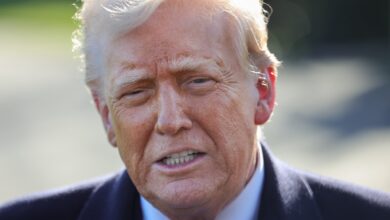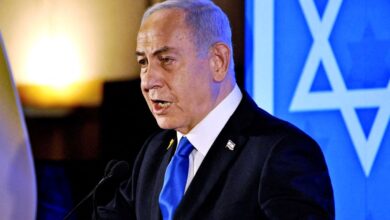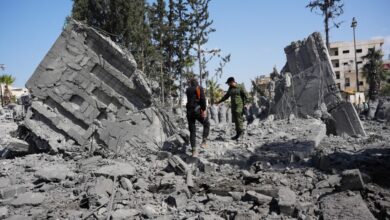Israel reinforces troops in West Bank ahead of US approval for partial annexation
Trump declares support for Israeli military control over any future Palestinian state
The Israel Defense Forces ordered additional infantry units to reinforce positions in the occupied West Bank ahead of the release of U.S. President Donald Trump’s proposed “deal of the century” plan to solve the Israeli-Palestinian conflict.
The plan, outlined by Trump and Israeli Prime Minister Benjamin Netanyahu at the White House on Tuesday, January 28, entails U.S. support for an Israeli plan to annex the entire Jordan Valley and all Israeli settlements in the West Bank – a Palestinian territory already under Israeli military occupation.
Under the proposal, Washington would throw its support behind Israel’s indefinite military occupation of all territory west of the Jordan River, including territories allocated for a future disarmed Palestinian state.
Israel agreed to a four-year settlement freeze in territories allocated for a future Palestine state – including roughly 30% of the West Bank plus a territorially extended Gaza Strip – while Palestinian leaders decide on whether or not to accept the deal.
Israeli Defense Minister Neftali Bennett instructed the IDF to prepare for possible violence in the West Bank ahead of the announcement. IDF troops reinforced positions near the Palestinian administrative capital of Ramallah, Reuters reported.
Haaretz, citing “military sources,” reported that the deployment would focus on towns northeast of Nablus, rather than the wider Jordan Valley.
“The State of Israel is facing crucial days of establishing its permanent borders and applying sovereignty to Jewish settlements in Judea and Samaria,” the Jerusalem Post quoted Bennett as saying.
“The IDF and the forces in the field are prepared for every scenario,” he said. “We are facing crucial days of setting boundaries and applying sovereignty … [and] threats from the Palestinian side will not deter us.”
Israeli officials told AFP that Netanyahu would approach parliament as early as Sunday for approval of the proposed annexation.
“Israel does not have to wait at all” to extend its control over the Jordan Valley and Israel’s West Bank settlements, a U.S. State Department official said on a phone call with journalists.
The United Nations has repeatedly deemed Israel’s occupation of the West Bank expansion of settlements illegal under international law, a charge Israel has rejected.
Netanyahu, who is facing a corruption indictment and contested reelection campaign, promised last year to annex Israel’s settlements in the West Bank if he is reelected.
Netanyahu poured praise on Trump during the announcement on Tuesday.
“On this day, you became the first world leader to recognize our sovereignty over parts of Judea and Samaria that are vital to our security and central to our heritage,” Netanyahu said before an audience at the White House.
“Too many plans tried to pressure Israel to withdraw from vital territory like the Jordan Valley,” Netanyahu said, describing the overwhelmingly Palestinian-inhabited area as “the very heart of the land of Israel.”
The prime minister said descriptions of Israel’s occupation of the Palestinian territory as illegal are “outrageous” and a “lie.”
Israeli governments have insisted on the need to maintain military control over the West Bank, held since 1967, for purposes of self-defense, citing a series of wars with its Arab neighbors since Israel’s founding in 1948.
Trump also met with Benny Gantz, Netanyahu’s rival, in Washington on Monday so that the deal’s announcement would not appear political, the State Department official said.
“We have the support of both parties, and almost all people,” Trump said Tuesday.
Palestinian leaders rejected the proposal long before its unveiling. Following a rare meeting with leaders of rival party Hamas in Ramallah on Tuesday, Palestinian President Mahmoud Abbas called the White House announcement “nonsense” and said his government’s response to the proposal is “a thousand no’s.”
Saeb Erakat of the Palestine Liberation Organization said Sunday that his side reserves the right to withdraw from the 1993 Oslo peace accords in response to the plan.
“It doesn’t really matter in the short run what the Palestinians say, we’re going to keep this option open to them for four years,” the State Department official said, describing Israel’s openness to accepting the possibility of future Palestinian state as an “incredibly important concession.”
Palestinian Authority officials suggested in recent weeks that they may cease cooperation with Israel on security matters in response to the White House plan.
Hamas, the Islamist group that controls the Gaza Strip, immediately rejected the plan, which requires the group and other Islamist militant factions to disband before negotiations with Israel can even begin.
Israel captured significant territory, including East Jerusalem, the West Bank, Egypt’s Sinai Peninsula, the Golan Heights and Gaza, during the 1967 war with its neighbors.
The Trump administration recognized Israel’s sovereignty over the Golan Heights, previously a part of Syria, last year. Israel willingly withdrew from Gaza in 2005 and from Sinai in 1982 following peace talks with Cairo.
Middle East ‘peace’ plan
AFP reported that more than a dozen Palestinian protesters were injured in clashes with Israeli forces across the West Bank as of Tuesday night.
The Trump administration’s plan offers Palestinian leaders a four-year window to come to the negotiating table with Israel, during which Israel will not construct any new settlements in areas laid out for a future Palestinian state.
The agreement first requires Hamas and other Islamist militant groups like Islamic Jihad to be dismantled.
The State Department official said that after that, “The Palestinian Authority, or a similar authority that would be acceptable to Israel would have to gain control of the Gaza Strip.”
“There would have to be an end to incitement [against Israel] in textbooks.”
Palestinian leaders also must recognize Israel’s right to exist, before any negotiations towards a state could begin.
It is unclear how Hamas could be disbanded. The party’s armed wing, the al-Qassam Brigades, boasts tens of thousands of fighters, and seized control of Gaza amid fighting with Fatah in 2007.
The White House proposal also offers an expansion of Gaza’s territory into Israel’s Negev desert, and the prospect of connecting Gaza and the West Bank via a high-speed rail line.
Trump also offered to open a U.S. embassy in a future Palestinian capital in East Jerusalem, even though he said the plan offers Israel’s sovereignty over an “undivided Jerusalem.”
The proposal includes an offer of a supposed $50 million in investment in the Palestinian territories and a high-speed rail line connecting Gaza and the West Bank.
“Neither Israel nor the United States want its fingerprints on a failed Palestinian state,” the State Department official said. “It has to be a country where they can raise capital.”
The ambassadors of Bahrain, Oman and the United Arab Emirates were present at the unveiling at the White House. Egypt’s foreign ministry voiced support for the deal.
Jordan’s foreign ministry Tuesday said “the only path” to a future Palestinian state entailed a return to 1967 borders.
A Palestinian ‘state-minus’
Under a draft of the plan released Tuesday by the White House, the U.S. would recognize Israel’s indefinite control of West Bank airspace.
A future Palestinian state would also be barred from possessing or developing combat aircraft, heavy machine guns, heavy armored vehicles, mines, missiles or military intelligence institutions.
It also bars a future state from striking “military, intelligence or security agreements with any state or organization that adversely affect the State of Israel’s security, as determined by the State of Israel.”
A demilitarized future state under Israeli occupation is a concept Netanyahu has previously referred to as a Palestinian “state-minus.”
“We refer to it as a ‘realistic’ two-state solution,” the State Department official said.
“Our goal is to demonstrate to the Palestinians that there is a state that they can aspire to and achieve, that they can meet many of the aspirations that they seek, [and] that there is a better life for them,” he said.
“It’s theirs for the taking,” the official said. “We’re hoping to capture the imagination of the Palestinian people. We think we’re offering them a lot.”












